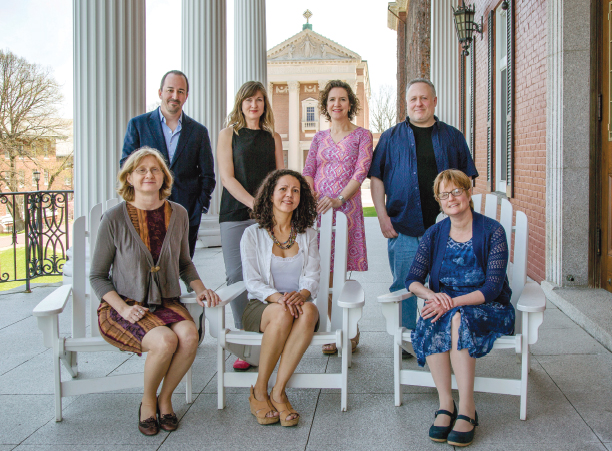 After years of research and accomplishments in their respective fields, eight Holy Cross faculty members have been promoted to the rank of professor. Below, the professors share their thoughts on their careers, scholarship and more.
After years of research and accomplishments in their respective fields, eight Holy Cross faculty members have been promoted to the rank of professor. Below, the professors share their thoughts on their careers, scholarship and more.
Susan Amatangelo, modern languages and literatures
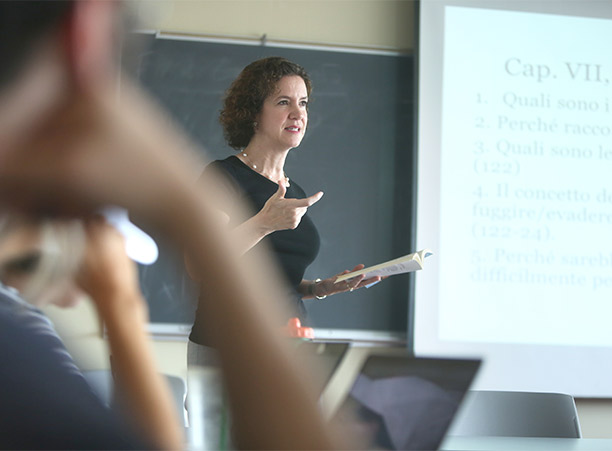
Susan Amatangelo, of the Italian program in the modern languages and literatures department, earned a B.A. in English and Italian from Smith College and an M.A. and Ph.D. in Italian literature from Harvard University. Her research focuses on 19th- and 20th-century Italian literature, Italian female writers and the representation of women in literature. She has been a member of the Holy Cross faculty since 1998.
At this point in your career, what is your proudest accomplishment?
What I find most gratifying at this point in my career is sharing my research with younger scholars and advanced students. These moments tell me that my scholarship, which obviously means a great deal to me, has influenced other people in a positive way and contributed to the growth of my field.
Why is studying a second language important for college students?
Learning a second (or third) language opens students' eyes to new cultural realities, with different ways of communicating, thinking, being and viewing the world. When they study Italian, for example, they not only acquire skills in a new language, but are also forced to consider how they think and express themselves in their native language.
Jeffrey A. Bernstein, philosophy
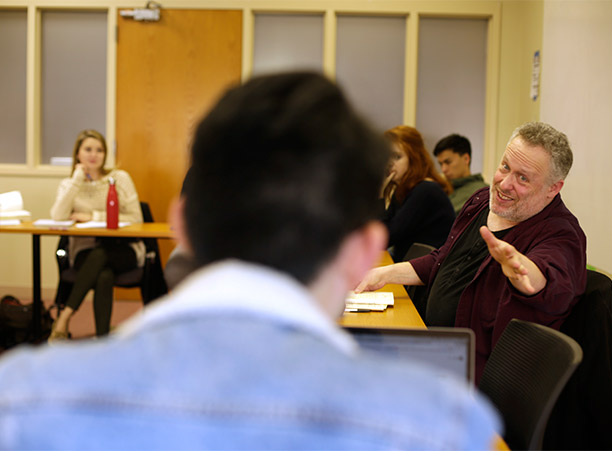
Jeffrey A. Bernstein, of the philosophy department, earned a B.A. in philosophy from Clark University and an M.A. and Ph.D. in philosophy from Vanderbilt University. His research focuses on modern European philosophy, classical German philosophy and Jewish thought. He has been a member of the Holy Cross faculty since 2001.
At this point in your career, what is your proudest accomplishment?
At this point in my career, my two proudest accomplishments are having taught students at Holy Cross for 17 years, and (after that) my book.
You've spoken widely on Jewish themes — why is it important for students at a Jesuit school to study other faiths?
The Jesuit mission involves understanding the particular communal context in which one lives in the hopes of bringing about a greater harmony ("for the glory of God," as Ignatius says). Judaism is a living community and tradition that plays a role in contemporary society. For that reason, I see my work on Jewish philosophy at the College as contributing to the vitality of the Jesuit project.
Rosa E. Carrasquillo, history
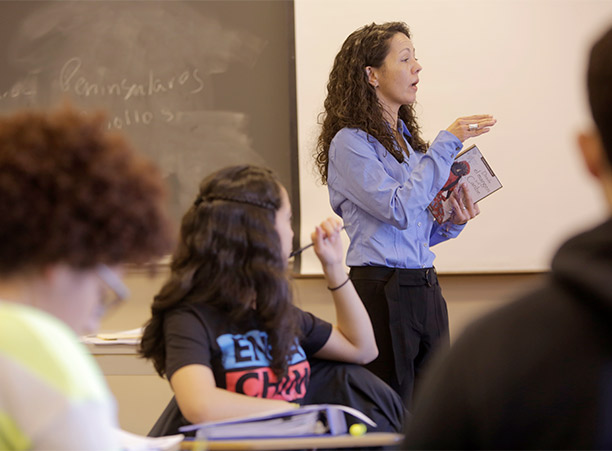
Rosa E. Carrasquillo, of the history department, earned a B.A. in history from the University of Puerto Rico and an M.A. and Ph.D. in Latin American history from the University of Connecticut. Her research focuses on Latin America, Afro-Caribbean history, gender history and the history of Latino/as in the United States. She has been a member of the Holy Cross faculty since 2006.
At this point in your career, what is your proudest accomplishment?
I think that it's always amazing when you see a student that initially struggled with basic history triumph in different programs at different universities. Publications and all of that are wonderful, but when you see students changing the world in one way or another, it's really powerful.
You wrote a book about Ismael Rivera, "'The People's Poet': Life and Myth of Ismael Rivera, an Afro-Caribbean Icon." What interested you about Rivera?
Ismael Rivera is an icon in many Latin American communities, particularly marginalized communities. I treated his life not just as an ordinary biography, but as a way of dealing with colonialism in Puerto Rico. He was such a people's person — so down to earth.
Jonathan Mulrooney, English
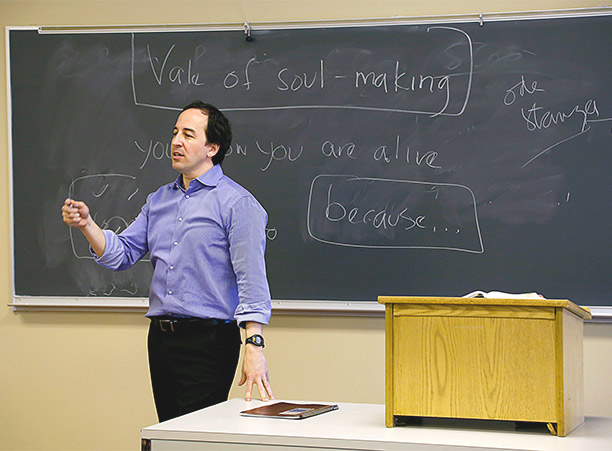
Jonathan Mulrooney, of the English department, earned a B.A. in English from Boston College, an M.A. in English from the University of Toronto and a Ph.D. in English from Boston University. He is the author of "Romanticism and Theatrical Experience" (Cambridge University Press, 2018) and many articles in the fields of romantic studies. He served as English department chair from 2011-2017 and has been a member of the Holy Cross faculty since 2001.
At this point in your career, what is your proudest accomplishment?
Like many of my colleagues at Holy Cross, I've tried to craft an academic career that integrates teaching and scholarship, and that models for my students how the life of the mind and the experiential life are interdependent. Working alongside people who share that value makes me proud.
What can romantics like Keats and Austen teach us about living in the modern world?
If those writers had anything in common, it was a belief that literature can help human beings find empathy and love during times of historical upheaval and uncertainty. Keats, Austen, Wordsworth and the Shelleys all believed that poetry could save us from ourselves. I still think it can.
Ellen Perry, classics
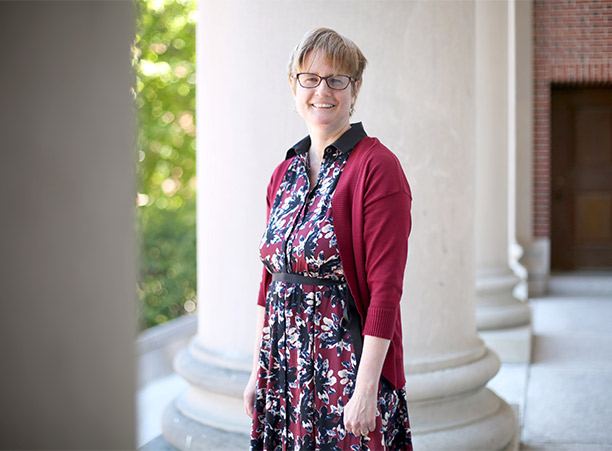
Ellen Perry, of the classics department, earned a B.A. in Greek from Swarthmore College and an M.A. and Ph.D. in classical art and archaeology from the University of Michigan. Her research focuses on classical archaeology, ancient sculpture, and Roman art and rhetoric. She has been a member of the Holy Cross faculty since 1997.
At this point in your career, what is your proudest accomplishment?
Co-editing an anthology in honor of my dissertation adviser and keeping it secret for two years. Great teachers and mentors should know how important they are to their students. I'm proud to have participated in that project.
How is the study of Roman architecture relevant in 2018?
Romans invented concrete. In fact, they invented a concrete that can set underwater. Every time we encounter shoddy construction in the modern world, we should remember that the Romans figured out how to design buildings, water supply systems, sewage systems and harbors that were attractive, effective and durable — so durable that many of them are still around for us to study.
Cristi Rinklin, visual arts
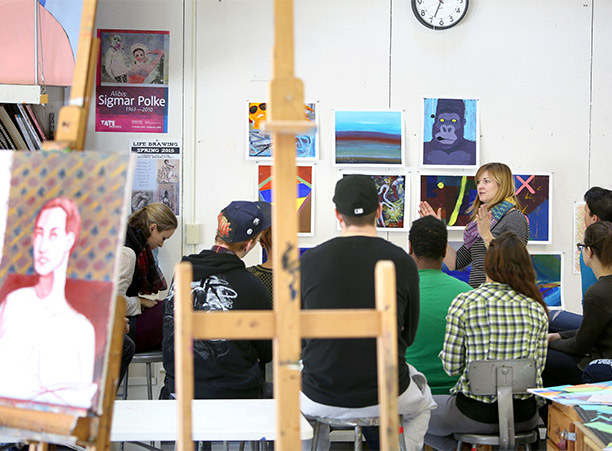
Cristi Rinklin, of the visual arts department, earned a B.F.A. in painting from the Maryland Institute College of Art and an M.F.A. in painting and drawing from the University of Minnesota. She has had numerous national and international exhibitions at galleries and museums throughout the United States and around the world. Her paintings have been included in the 2010 and 2012 Northeast editions of New American Paintings. She has been a member of the Holy Cross faculty since 2002.
At this point in your career, what is your proudest accomplishment?
Professionally, I would say my 2012 solo exhibition at the Currier Museum of Art in Manchester, New Hampshire. As for teaching, my proudest accomplishments are my students’ successes. Several students with whom I worked very closely are having successful careers as practicing and exhibiting artists, which brings me tremendous pride.
Should students who view themselves as "non-artists" consider taking a class in the visual arts? Why?
Absolutely. There are so many transferrable skills in visual arts courses, and statistics have shown that students with creative skills are more innovative and, oftentimes, more employable. Learning to problem-solve through physical creation provides a skill that can put one way ahead of the crowd.
Neel Smith, classics
classics department, earned a B.A. in classical archaeology from Harvard University, studied at the University of Zurich and the American School of Classical Studies in Athens and earned a Ph.D. in classical archaeology from the University of California, Berkeley. His research focuses on digital classics, with a special interest in scholarship (both scientific and literary) in antiquity. He has been a member of the Holy Cross faculty since 1994.
At this point in your career, what is your proudest accomplishment?
I am especially proud to see what my students can do, even before they graduate from Holy Cross. In the past five years, students I have worked with have presented at international scholarly conferences in 10 different countries in North America and Europe.
Archeology and technology seem, at first, to be strange partners — how do they connect?
No matter what your discipline, in 2018 everyone does digital scholarship, even if we don't always recognize it. Digital technologies can extend familiar scholarly methods to a previously unknown scale and speed.
Cynthia Stone, Spanish
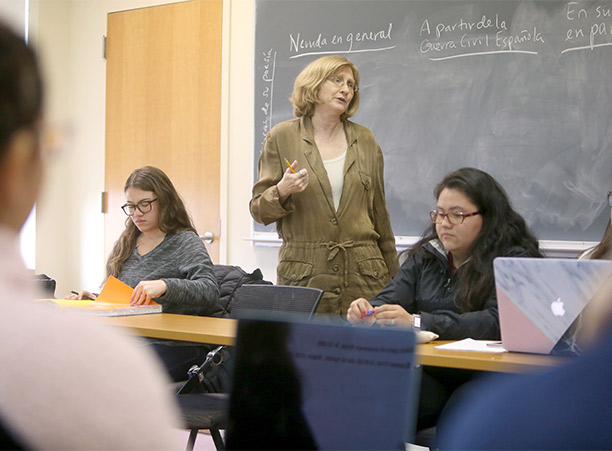
Cynthia Stone, of the Spanish department, earned a B.A. in Spanish from Williams College, an M.A. in Spanish and Spanish American literature from Columbia University and a Ph.D. in colonial Spanish American literature from the University of Michigan. Her research focuses on Mesoamerican codices, early missionary writings in the New World, films set in colonial Spanish America and translations of indigenous traditions. She has been a member of the Holy Cross faculty since 1992.
At this point in your career, what is your proudest accomplishment?
One of my biggest challenges as a scholar-teacher has been adapting my primary field of colonial Latin American studies to an undergraduate audience. Fortunately, the Spanish department allows for a wide range of disciplinary approaches. Some of the courses I have developed explore issues of cultural change and identity over time; others focus on intersections between words and images, whether in the form of contemporary films based on colonial-era texts or the analysis of how to bring pre-Colombian pictographic texts to life through digital technologies.
You’re involved with the Latino History Project of Worcester — tell us about that.
When I arrived in Worcester in 1992, the Latino population was mostly of Caribbean origin and limited to a few neighborhoods. Since then, it has greatly diversified and expanded, with over 40 percent of students in the Worcester Public Schools self-identifying as Latino or Hispanic, many with families from Central or South America or Mexico, along with increasing numbers of Latino professionals. In collaboration with the Worcester Historical Museum, the Latino History Project of Worcester has been collecting oral histories, cataloguing artifacts and compiling a historical narrative and timeline from the perspective of some of the original pioneer families, as well as more recent arrivals. Over 70 Holy Cross students have participated to date as interviewers, transcribers, translators and researchers.
Written by Jane Carlton for the Summer 2018 issue of Holy Cross Magazine.
About Holy Cross Magazine
Holy Cross Magazine (HCM) is the quarterly alumni publication of the College of the Holy Cross. The award-winning publication is mailed to alumni and friends of the College and includes intriguing profiles, make-you-think features, alumni news, exclusive photos and more. Visit magazine.holycross.edu/about to contact HCM, submit alumni class notes, milestones, or letters to the editor.

